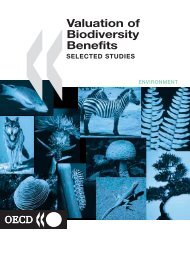Untitled
Untitled
Untitled
- No tags were found...
You also want an ePaper? Increase the reach of your titles
YUMPU automatically turns print PDFs into web optimized ePapers that Google loves.
Ochang Branch InstituteBiotechnology ProcessEngineering CenterRESEARCHERSHong-Weon Lee hwlee@kribb.re.krFermentation physiology & Microbial engineeringBioprocess engineeringJoon-Ki Jung jkjung@kribb.re.krBiochemical engineeringMolecular breeding of fungi and yeastEun-Gyo Lee eglee@kribb.re.krBiochemical engineering & Animal cell cultureSeparation and purificationJung-Oh Ahn ahnjo@kribb.re.krBiochemical engineeringMolecular breeding of yeast and bacterial cellsYeon-Gu Kim ygkim@kribb.re.krBiochemical engineeringAnimal cell cultureRESEARCH AREASBioprocess development and scale-upProcess development and scale-up studies on microbialexpression systems, fermentation, downstream processand chromatographic purificationMicrobial fermentation and animal cell cultureHigh quality and high yield production of valuablemetabolites, carbohydrates, enzymes, and recombinantproteins by batch, fed-batch and continuous culturesProduction of biomaterials and biopharmaceuticalsProcess development for the production of bioactivecompounds, fine chemicals, biofuels, enzymes,carbohydrates, and biopharmaceuticalsDirector Hong-Weon LEET + 82-43-860-4520F +82-43-860-4529E hwlee@kribb.re.krACHIEVEMENTSDevelopment of biological process for the production of microbial metabolitesWe have developed pilot-scale processes for the production of microbial metabolites suchas amino acids (ornithine, threonine, and proline), antibiotics, and shikimic acid. Thistechnology includes not only process development but also strain development bytraditional mutagenesis and use of genetically-engineered strains.Over-expression and purification of recombinant proteinsWe have developed technology for the production of heterologous proteins of interest inboth E. coli and P. pastoris. This technology, which involves over-expression of a targetprotein, fusion tag selection, cleavage optimization, and serial chromatographicpurification, can be applied to manufacturing therapeutic proteins and functional enzymes.Development of a novel Pichia expression systemP. pastoris is increasingly used as a host system for heterologous protein expression forboth academic and industrial processes. In this system, most recombinant proteins havebeen produced using the alcohol oxidase I promoter (PAOX1), for which the highly volatileand inflammable compound methanol is required for transcription. As alternatives toPAOX1, we developed two strong methanol-free promoters: translation elongation factor1a promoter (PTEF1) with highly growth-associated expression characteristics andphosphate-responsive promoter (PPHO89) of a sodium phosphate symporter. Also, a costeffectiveand simple PTEF1- and PPHO89-based fermentation process was developed forindustrial applications. Furthermore, we developed an easy-to-use multicopy system in P.pastoris using autonomous replication sequences (ARS) and an episomal plasmid tomaintain multiple genes of interest in P. pastoris and enhance heterologous expressioncompared with a single copy integration in P. pastoris.Developement of in silico constraints-based flux analysis tool based on the cofactorregeneration viewWe have developed in silico constraints-based flux analysis tool which can characterizethe experimentally observed microbial cell growth, metabolite production, and theircorresponding metabolic states based on the cofactor regeneration view. Using this tool,we have comparatively investigated the overall phenotypic effects of specific geneknockoutand carbon source utilization on cell growth and target metabolites, such asshikimic acid and isoprene. Subsequent constraints-based flux analysis of genome-scaleE. coli metabolic model allowed us to gain non-intuitive insights into the metabolicrequirements of target metabolite biosynthesis with respect to NADPH regeneration. Suchin silico analysis can potentially be used for a better understanding of cellular physiologyin various metabolic engineering studies, e.g., cofactor engineering, in the future.SELECTED PUBLICATIONSHong Weon Lee (Co-author) Microb Cell Fact. 9:e50.Genome-scale metabolic reconstruction and in silico analysis of methylotrophic yeastPichia pastoris for strain improvementEun Gyo Lee (Co-author) Comp Immunol Microbiol Infect Dis. 33(6):e41-9.Suppression of proinflammatory cytokine production by specific metabolites ofLactobacillus plantarum 10hk2 via inhibiting NF-κB and p38 MAPK expressionsWe aim to develop industrial platform technology for biological products. In particular, we intensively carry out a process scale-uptowards the optimization and commercialization for the production of biomaterials and biopharmaceuticals using pilot-plant facilitiesin order to expand research outcomes and to stimulate commercialization. Additionally, we systematically support the businessactivities of the bioindustry and cultivating human resources through academic-industrial collaboration.72 KRIBB Annual Report 2010KRIBB Annual Report 201073












